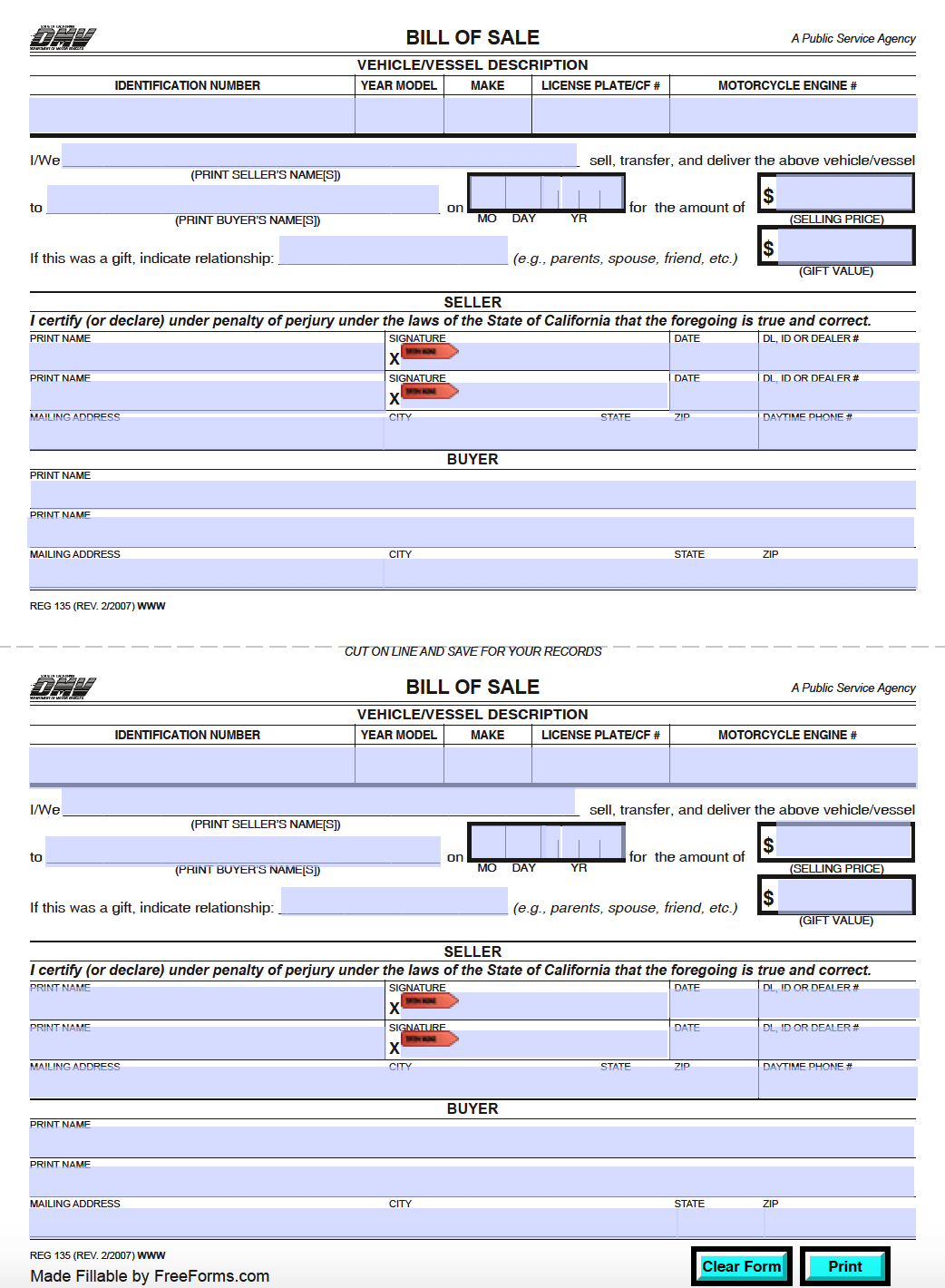The California DMV bill of sale form is not legally required in the state of California. Even though it is not enforced by law, it is definitely a good idea to utilize this form. A bill of sale proves that a sale and purchase occurred between two parties. Certain information is transcribed to the form such as the vehicle’s details, buyer/seller info, the purchase amount, and the date of the sale. Once the form has been completed, the seller then signs the document making the transaction official. For the buyer, having this can help when it comes to registering and determining the VLF(Vehicle License Fee) which is based on the purchase price of the vehicle.
How to Register a Vehicle
You have 10 days to register your vehicle after purchase. To register, visit one of California’s DMV locations and bring the following materials:
- The vehicle’s title (if the title has been lost or stolen, you must fill out the Application for Duplicate or Transfer of Title). Be sure to transcribe the vehicle’s mileage onto the document (this is only necessary if the vehicle is less than 10 years old).
- Bill of sale (proof that there has been a transfer of ownership).
- A valid form of identification.
- Proof of an active insurance policy.
- A filled out and signed California Application for Title or Registration (Form REG 343).
- A validated smog certificate is required in certain counties, search your zip code to see if you will need to acquire one.
- Proper funds to pay the standard registration fees.
How to Register a Vessel
The State of California specifies any motor-propelled vessel or sailboat larger than 8 feet, that is to be used on a body of water within the state or coastline must be registered. The exceptions to this rule are if the seacraft is a seaplane, sailboat with a length of fewer than 8 feet, a vessel to be used for racing purposes, houseboat, lifeboat, or if the boat is only to be utilized on an invariable track. In addition, if the boat is registered in another state or country, registration is not required unless you plan to utilize it for a period of longer than 120 days.
To register your boat, obtain the following documentation and present it at your nearest California DMV location:
- A completed California Application for Registration Number, Certificate of Ownership, and Certificate Number for Undocumented Vessel (Form Boat 101).
- A valid record of ownership of either a Bill of Sale, original out-of-state Title, or the bond for the vessel (if worth $2,000 or more). An official Conditional Sales Contract will also be accepted as long as it is equipped with a notation indicating payment has been made, the buyer’s full name, and any remaining lienholders to the vessel.
- Valid method to pay for all fees and taxes. This will differentiate depending on the value of the vessel and whether or not it was purchased new, used, and/or out-of-state.
How to Write
Step 1 – Download in Adobe PDF.
Step 2 – Vehicle/Vessel Description – Start by inputting the following vehicle information:
- VIN (Vehicle Identification Number)
- Year Model
- Make
- License Plate/CF #
- Motorcycle Engine #
Step 2 – Sale Information – List the required details that pertain to the sale/purchase of the vehicle:
- Seller’s Printed Name
- Buyer’s Printed Name
- Date of Transaction
- Dollar Amount of the Selling Price
- Relationship (only if the vehicle is being gifted from one individual to another)
- Gift Value (an estimation of how much the vehicle is worth)
Step 3 – Seller Information and Signature – The seller(s) must provide the following:
- Printed Name
- Signature
- Date of Signature
- DL ID or Dealer # (if the vehicle is being sold by a dealership)
- Mailing Address
- City
- State
- Zip Code
- Daytime Phone #
Step 4 – Buyer Information/Signature – The buyer(s) must enter the following information:
- Printed Name
- Mailing Address
- City
- State
- Zip Code
Step 5 – Cut on Line and Save for your Records – This document comes with 2 forms. Both forms should be filled out, then cut at the line to distribute a copy to each party.



0 comments
Comments are closed.